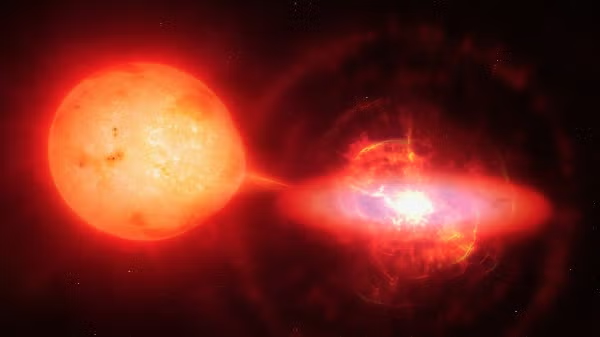Artificial intelligence goes to camp

Anushka Mukhopadyay and Divya Kalanee were two of the underrepresented students who spent three weeks on ASU's West campus getting a head start in the growing field of artificial intelligence. Photo by Amber Orquiz/New College
Eduardo Hinojosa has a passion for the field of artificial intelligence. But the 16-year-old was at a dead end trying to pursue his digital passion in his hometown of Redwood City, California.
“My school doesn’t offer any computer science classes, so I was just looking for something to teach me and guide me in the right direction.”
That something turned out to be a summer camp on Arizona State University’s West campus. “I felt inspired to come to this camp because I want to keep up with the industry, and I haven’t found many options to help me in this field,” Eduardo said.
He was among the dozens of high school students from across the nation who converged for the inaugural ASU AI4ALL camp. Over three weeks in June and July, campers collaborated to develop a firm grasp of the growing field of artificial intelligence. But, this was no woodsy hiking and canoeing summer camp. These high school students tackled real-world problems, such as heart disease prediction, flu prediction, disaster relief, Twitter bot detection and fake news detection using state-of-the-art AI and machine learning methods.
“Exposing students to AI in high school is important,” said Kuai Xu, ASU cloud computing and network security professor and ASU AI4ALL director. “Because understanding AI, a powerful tool and technology rapidly changing the world, will empower high school students to solve many current societal problems from innovative and unique perspectives and will inspire them to become future AI researchers, engineers, scientists and leaders.”
The AI4ALL camp took place on ASU’s West campus in collaboration with ON Semiconductor and AI4ALL. This partnership was built upon the aligning belief that AI instruction should be available and offered to all students regardless of gender or ethnicity.
“This camp ensures that underrepresented and female students understand what they can offer to this male-dominated field to make AI stronger and to help influence the technology,” said Gail Ricketts of ON Semiconductor.
“AI4ALL is a nonprofit organization dedicated to increasing diversity and inclusion in artificial intelligence, and right now, we know that there are many folks who have been historically underrepresented in this space,” said Wells Lucas Santo, education manager at AI4ALL. “The people who are creating this technology are not representative of the people who are using this technology.”
Tiffany Shumate, AI4ALL’s director of university programs, said that AI4ALL’s goal is to reach these underrepresented students to create equity and diversity in the field, while preparing them for careers in AI.
“When we think about diversity, we think about socio-economic status, race, sexual orientation and gender, but we also think about geographical location. Many students with access to AI education in the U.S. are concentrated in coastal cities,” Shumate said. “We are excited to work with ASU to reach students in Arizona and the Southwest with approachable and inclusive AI education.”
ASU joins 10 other participating universities who host AI4ALL summer programs across the U.S. and Canada.
AI4ALL partners with universities that are committed to expanding access for underrepresented students in high school in an effort to reach them as they are considering their future.
“We want to show these students that this is a field they can excel in, even if they’ve never done this before,” Santo said. “We want to spark passion and enthusiasm with students early on.”
Additionally, targeting high school students builds a necessary pipeline of students into the university and out into the workforce in AI. AI4ALL strategically partnered with ASU and Phoenix-based ON Semiconductor to reach these students in the Southwest region of the country. The support of these organizations allowed ASU to provide scholarships to many students attending the camp.
As a three-week residential program, campers had the opportunity to go on a variety of weekend excursions including a water park, Fourth of July celebration and the Grand Canyon. Additionally, they had the opportunity to tour ON Semiconductor to see AI in action. In the evenings, they took part in team building, summer movies and a pool bash.
“All the students worked hard during their class time learning AI, and then played hard in the evening being campers!” said Carolyn Starr, SummerUP camp director.
Vishal Sachdev of Champaign, Illinois, enrolled his daughter, Shreya, in AI4ALL. “As a parent, you want to give your kid awareness of different career options, and artificial intelligence is certainly one that is influencing virtually every field," he said. "So even if your child is not going into computer engineering, the techniques learned here are relevant across all domains.”
AI4ALL’s Shumate agrees that even if students don’t pursue a career in AI, it is important for them to understand the impact AI will have on every career. She added, “AI literacy is at the heart of access in this program.”
ASU will host AI4ALL again next summer as part of the SummerUP series of camps to provide even more students access to explore the growing field of AI.
For more information or to be a part of the program through company field trips, providing guest lecturers or sponsorship, please reach out to camp director Carolyn Starr at Carolyn.Starr@asu.edu.
More Science and technology

A spectacular celestial event: Nova explosion in Northern Crown constellation expected within 18 months
Within the next year to 18 months, stargazers around the world will witness a dazzling celestial event as a “new” star appears in…

ASU researcher points to fingerprints as a new way to detect drug use
Collecting urine samples, blood or hair are currently the most common ways to detect drug use, but Arizona State University…

Learn about the secrets of forensic science straight from the experts
Over the next week, true crime enthusiasts will have a rare opportunity to discover the secrets of forensic science as experts…

